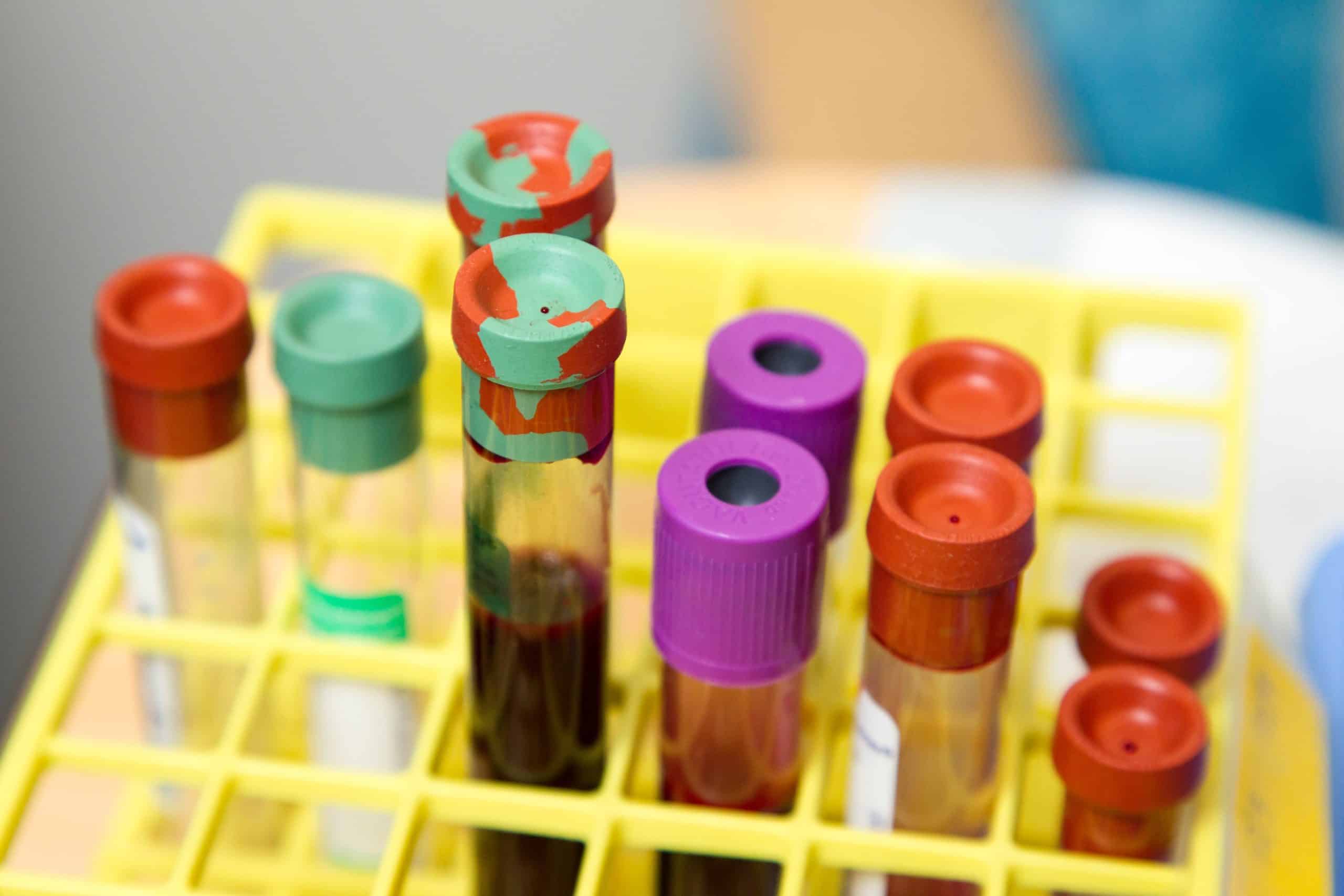Nutrition Labs to Ask For If You Have IBD
Here at The Crohn’s and Colitis Dietitians we work really hard to empower our clients to advocate for themselves and to stay on top of their healthcare. One way we do this is by consistently asking about nutrition-related labs that could be impacting the disease process.
Nutrient deficiencies can commonly occur in IBD due to inflammation raising the need for nutrients, poor absorption caused by changes to the digestive tract, medications impacting nutrient status, bleeding, and overall poor nutrient intake by reducing the total amount of food eaten or by restricting certain food groups.
Today we will be discussing the top nutrition labs to ask your healthcare provider for if you have IBD.
Iron
Iron studies are really important for those living with IBD to determine if you have iron deficiency or anemia. Markers included in iron studies are Ferritin, Transferrin, Percent Saturation, and Total Iron Binding Capacity. This information coupled with results from a Complete Blood Count (CBC), including Hemoglobin and Hematocrit, help providers determine deficiency and appropriate interventions.
Here is a brief summary of what each of the aforementioned iron study markers are, if you need a quick refresher :
- Ferritin: a blood protein that contains iron; serum ferritin shows us how much iron the body stores
- Transferrin: a protein in blood that binds to iron and transports it in the body
- Percent Saturation: checks how many places on your transferrin that can hold iron are actually doing so; normal values are 15% to 50%
- Total Iron Binding Capacity: measures the blood’s ability to attach itself to iron and transport it around the body
- Hemoglobin: a protein in your red blood cells that carries oxygen to your body’s organs and tissues and transports carbon dioxide from your organs and tissues back to your lungs
- Hematocrit: the ratio of the volume of red blood cells to the total volume of blood
Iron plays a vital role in oxygen transport, red blood cells, energy production, our immune system, and cognitive function (thinking and focus). This is why deficiency can feel like extreme fatigue, difficulty focusing, and shortness of breath.
Iron-deficiency anemia is common among those with IBD, with some studies suggesting up to half of IBD patients may have iron deficiency anemia (1).
It’s important to test for iron status and dose appropriately because too much iron supplementation can be harmful and not addressing a deficiency adequately can be dangerous. You can read more about our top tips for resolving iron-deficiency anemia in IBD here.
When to ask for testing:
It is reasonable to ask your doctor to run an iron panel at least once a year. Depending on how severe your anemia may have been, it may be appropriate to test every 3-6 months to determine appropriate treatment.
Vitamin D
Vitamin D is another important nutrient for IBD patients to regularly check. Inflammation can lower Vitamin D status by increasing the body’s demand for it. As reviewed in one of our previous blogs, we discussed ways vitamin D is important in IBD, including:
- Vitamin D playing a protective role in gut health
- Up to 30-40% who suffer from IBD also have Vitamin D deficiency
- Low levels are associated with increased disease activity
- Vitamin D may have a positive impact on the gut microbiota
Recent studies have found a link between IBD and Vitamin D deficiency. In fact, 30-40% of IBD patients may have Vitamin D deficiency. Low levels of Vitamin D are correlated with flare frequency and higher severity in IBD patients (2).
There are several factors that influence Vitamin D status such as latitude, sun exposure, skin color, age, inflammation, etc.
It’s important to work with your healthcare provider to dose Vitamin D appropriately, however a dose of 2,000-4,000 IUs per day is generally safe to maintain status or prevent deficiency.
When to ask for testing:
Testing Vitamin D status annually is important to determine if supplementation is warranted, especially if you have experienced a recent flare, have limited sun exposure, or inflammatory markers are high.
Vitamin B12 and Folate
Vitamin B12 and folate are both nutrients absorbed in the small intestine and commonly low in IBD due to the impact on absorption of this area of the gut. Deficiencies in Vitamin B12 and Folate can lead to macrocytic anemia, hyperhomocysteinemia, and neurologic and psychiatric disorders (3).
Vitamin B12 and folate deficiencies can cause symptoms like:
- Extreme fatigue
- Lethargy
- Shortness of breath
- Heart palpitations
Like many factors related to fatigue in IBD, it’s important to be mindful of potential nutrient deficiencies and regularly screen for them.
When to ask for testing:
If you have been experiencing any of the deficiency symptoms mentioned above, asking for nutrition-related labs would be appropriate. Adding Vitamin B12 and folate to your annual list of labs would be helpful as well.
Zinc
Poor zinc status is associated with poorer health outcomes in IBD. In fact, one study showed insufficient zinc to be associated with anemia, higher CRP values, and higher fecal calprotectin levels (4).
Zinc plays a pivotal role in the immune system and healing, so poorer status makes sense that it would lead to poorer outcomes. Low zinc status is also commonly seen in chronic diarrhea, likely due to alterations made to the immune response by insufficiency.
Again, working with your healthcare provider to determine appropriate dosage is important because too much can cause toxicity, mask other deficiencies, interact with medications, and induce symptoms.
When to ask for testing:
Certainly if you have experienced chronic diarrhea, assessing zinc status would be appropriate. If you have had chronic symptoms, reach out to your healthcare team to discuss nutrition-related labs and their potential for deficiency.
Key takeaways
Nutrient deficiencies are common in IBD and it’s important to regularly screen for them. Dosage is not straightforward and takes a client-centered approach to determine appropriate supplementation. Now is a great time to discuss nutrients of concern with your provider!
We are now booking new clients so we are happy to help if you are ready to outsource your nutrition and nutrition support to professional, IBD-specialized dietitians. You can schedule a free consultation here.
____________________________________________________________________________
References:
Jimenez K, M, Gasche C: Management of Iron Deficiency Anaemia in Inflammatory Bowel Disease. Acta Haematol 2019;142:30-36.
Pan Y, Liu Y, Guo H, Jabir MS, Liu X, Cui W, Li D. Associations between Folate and Vitamin B12 Levels and Inflammatory Bowel Disease: A Meta-Analysis. Nutrients. 2017 Apr 13;9(4):382. doi: 10.3390/nu9040382. PMID: 28406440; PMCID: PMC5409721.
Siva S, Rubin DT, Gulotta G, Wroblewski K, Pekow J. Zinc Deficiency is Associated with Poor Clinical Outcomes in Patients with Inflammatory Bowel Disease. Inflamm Bowel Dis. 2017 Jan;23(1):152-157. doi: 10.1097/MIB.0000000000000989. PMID: 27930412; PMCID: PMC5177471.
Yuli Guzman-Prado, MD, MSc, Ondrej Samson, Jonathan P Segal, PhD, Jimmy K Limdi, FACG, Bu’Hussain Hayee, PhD, Vitamin D Therapy in Adults With Inflammatory Bowel Disease: A Systematic Review and Meta-Analysis, Inflammatory Bowel Diseases, Volume 26, Issue 12, December 2020, Pages 1819–1830, https://doi.org/10.1093/ibd/izaa087




0 Comments
Trackbacks/Pingbacks